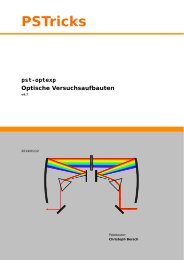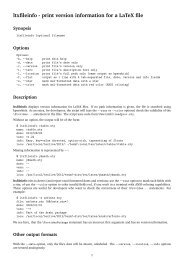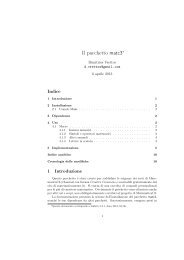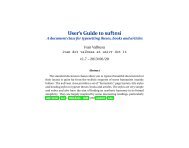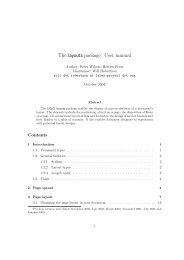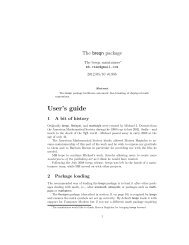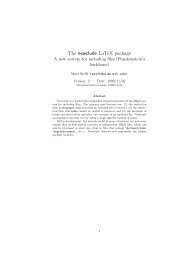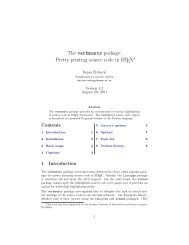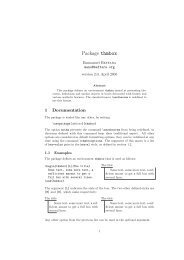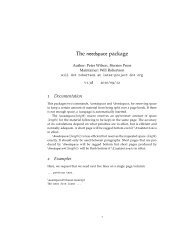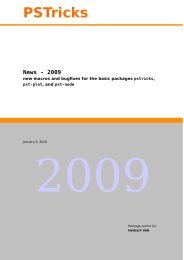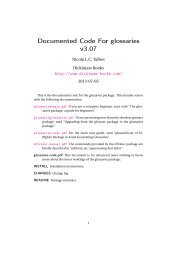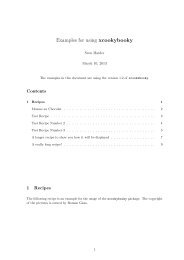The csquotes Package
The csquotes Package
The csquotes Package
You also want an ePaper? Increase the reach of your titles
YUMPU automatically turns print PDFs into web optimized ePapers that Google loves.
<strong>The</strong> style usually seen in French books uses semantically strict punctuation placement.<br />
<strong>The</strong> unusual aspect of this style is the footnote mark, which is placed inside<br />
the quotes, before the terminal punctuation mark. Given the above input, we need<br />
the following output:<br />
« This is a complete sentence 1 . »<br />
« This is an incomplete sentence 2 ».<br />
This is accomplished by the following definitions:<br />
\renewcommand{\mkcitation}[1]{\footnote{#1}}<br />
\renewcommand{\mktextquote}[6]{#1#2#6#4#3#5}<br />
Note that the spacing of the quotation marks, as is common in French typography,<br />
is handled by the quote style, as defined with \DeclareQuoteStyle. <strong>The</strong>re is no<br />
need to deal with these details when redefining \mktextquote and similar hooks.<br />
\mktextquote will get the quotation marks plus spacing as parameters #1 and #3.<br />
In addition to language and style specific adaptions, the formatting hooks discussed<br />
in this section may be used to further automate the quoting process. For<br />
example, they can be configured to automatically insert an ellipsis mark when<br />
quoting a sentence truncated at the end. In the following examples, we assume<br />
these lines of input:<br />
\textquote[citation]{This is an incomplete sentence}.<br />
\textquote[citation][.]{This is a complete sentence}<br />
\textquote[citation]{This is a complete sentence.}<br />
Let’s assume American-style quotes combined with citations in footnotes. Our previous<br />
definition for that was:<br />
\renewcommand{\mktextquote}[6]{#1#2#4#5#3#6}<br />
We need to insert an ellipsis mark if the 〈punct〉 argument of the citation command<br />
is empty, or if it was omitted. Parameter #4 will be blank in both cases:<br />
\renewcommand{\mktextquote}[6]{%<br />
#1#2\ifblank{#4}{ \textelp{}}{#4}#5#3#6}<br />
Given the above input, this definition will yield the following output:<br />
“This is an incomplete sentence [. . .].” 1<br />
“This is a complete sentence.” 2<br />
“This is a complete sentence. [. . .]” 3<br />
<strong>The</strong> first two cases are handled correctly but the third one needs more tuning:<br />
there is a spurious ellipsis because the final period is not passed to \textquote as<br />
a separate 〈punct〉 argument, but included in the quotation. To fix that, we add an<br />
additional \ifpunct test to check if the quoted text ends with a punctuation mark,<br />
and omit the ellipsis if this is the case:<br />
\renewcommand{\mktextquote}[6]{%<br />
#1#2\ifblank{#4}{\ifpunct{}{ \textelp{}}}{#4}#5#3#6}<br />
24



